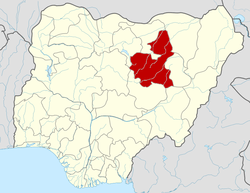Dass, Nigeria
| Dass, Nigeria | |
|---|---|
| LGA and town | |
| Country | Nigeria |
| State | Bauchi State |
| Time zone | WAT (UTC+1) |
Dass is a Local Government Area of Bauchi State, Nigeria. Its headquarters are in the town of Dass.
It has an area of 535 km² and a population of 89,943 at the 2006 census.
The postal code of the area is 740.[1]
History
People began to settle in Dass as far back as the period before the jihad of Danfodiyo around the foot and on the Mbula hill most of the early settlers came in search of security, which they hid in caves and on the hilltop to avoid attack by their enemies. Later at the early part of the 19th century the during the jihad of Shehu Danfodio Jarawa people immigrated to the area in search for security and respite. By the middle of the century they had settle at the foot of Mbula hill. The are began her administrative role a year before the amalgamation of Nigeria, when the colonial masters gave the area a third class chiefdom in 1913. This was given to the leader of the Jarawa known as Dukkurma who unites the groups and ruled up to 1927 when his son who was educated in Bauchi by the British colonial masters Alh. Usman Maleka, succeeded after the death of Dukkurma. During the reign of Usman Maleka the area had demonstrated rapid growth and development which is the by product of valued leadership and promotion of peace throughout the diverse ethnic and cultural backgrounds of the people. Similarly during his reign the community was considered by the committee on local government creation in which in 1976 the area was given local government area with full administrative function it at the same time with the birth of the then Bauchi state (i.e.) 1976. A year later in 1977 after the Chief died he was succeeded by his son Alh. Bilyaminu Othman who propelled the rapid growth of the emirate to 2nd class and up to the first-class emirate in 1983 and 1997 respectively.
Dass is endowed with rich agricultural land that provides Bauchi state and neighbouring states with good rice and maize which are the staple food of the community. Dass has been peaceful despite diverse ethnic groups. The local government now is blessed with first class traditional leader Alh. Usman Bilyaminu Othman who succeeded his late father Alhaji Bilyaminu Othman. Dass has fourteen districts: Bununu, Gimsa,Gital, Wandi, Bundot, Polchi, Lukshi, Baraza, Dott, Bazali, Bajar, Durr, Bagel and Zumbul.
Education
Both western and Islamic educational systems have reached the community since before the amalgation of the country in 1914. The first school established in the community is the then Central primary school Dass, now Wazir Mazadu primary school. From one primary school at the early 20th century to more than 100 schools including 25 secondary schools and two private tertiary institutions. The Islamiyya school was predated by the almajiri system in the community. Following the adoption of the western system of education in the country, the earlier almajiri schools mainly set for Quranic education, Islamiya system was adopted. The community has more than 100 Islamiyya schools pioneered by Usman Maleka memorial Islamiyya. The community has produced several university dons whom some have reached the rank of professors and host of PhDs. The Dass local education has more than 30 first degree holders and more than 700 NCE holders.
References
- ↑ "Post Offices- with map of LGA". NIPOST. Retrieved 2009-10-20.
| |||||||||||||
